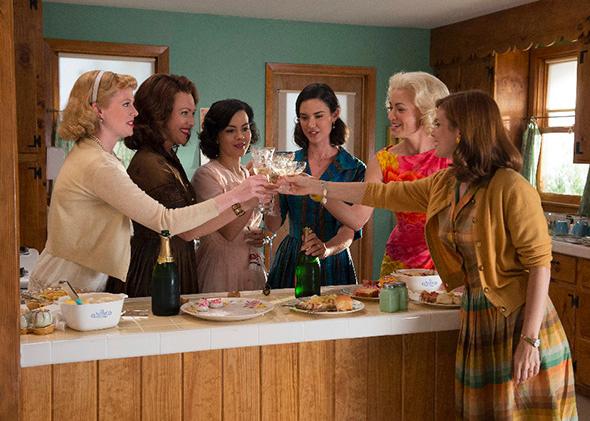It’s 1961, and Alan Shepard is lifting off is his rocket ship, endeavoring to become the first American to travel in space. At home, his pillar-of-strength wife, Louise, watches on television with her stone-faced exterior slowly crumbling, until she ultimately deigns to clasp the hand of a Life magazine reporter, the only person she’d allow in her presence that afternoon. Later, all her friends—the wives of her husband’s fellow astronauts—show up with dessert.
Given the time period in which it places itself—the early ’60s space race—and the finale hoopla we’ve so recently experienced, there’s a temptation to compare The Astronaut Wives Club to Mad Men, as I suspect we’ll be doing for a long time with any show that seeks to replicate the ’60s. (It doesn’t do much to dissuade comparisons when this show has a Betty and a Trudy, though these are the names of the real Mercury Seven astronauts and their wives.)
The same comparisons to Mad Men were heaped on ABC’s Pan Am, another glossy take on a bygone American era. But that’s a lot of pressure for a show that aims to please more than it aims to probe or provoke. Astronaut Wives Club is less reminiscent of Mad Men’s psychologically complicated landscape than it is of Desperate Housewives (most, if not all, of the wives appear to be harboring some kind of secret or another). It even shares the muted institutional color palette of Masters of Sex, though that’s likely where those comparisons should end. But the Mad Men comparisons won’t do either show any favors. Astronaut Wives Club isn’t meant to plumb the depths of identity like Matthew Weiner’s show did, nor does it seem all that interested in the ins and outs of period detail. At least in the pilot episode, the space-race ‘60s is merely a setting.
Dominique McElligott (Hell on Wheels) is a bit more impenetrable than intriguing as Louise, but Odette Annable (Brothers & Sisters), Erin Cummings (Spartacus: Blood and Sand), and Yvonne Strahovski (Chuck) are standouts. Overall, the characterizations of the wives are more than a little pat. There’s the stoic one, the brassy one, the schemer, the innocent, the ditz—though hopefully a lot of the work of the limited series (it’s being sold as a “10-episode event,” which usually translates to “miniseries unless it’s a hit”) will be to chip away at these types.
The plot certainly seems to be moving along quickly enough that radical character development wouldn’t be out of the question. The first 10 minutes appear to be setting up a season’s worth of a plot: the famed Mercury Seven astronauts are all vying to become the first American in space, and while they’re competing on the launchpad, their wives are fighting the PR war for them. It initially seems the 10-episode series will take us through this competition, ending with the winning astronaut making his first trip to space—particularly since anyone with the ability to click to Wikipedia knows that it’s Alan Shepard, husband to our main character, who gets chosen. But Shepard’s history-making flight is dispatched within the first episode, and, by the end of the hour, we’re looking at the race to the moon as the sole motivating plot to carry us through the series. It’s a slick little raising-of-the-stakes, and it manages to keep the public-relations angle on the front burner for the wives.
The aforementioned Life reporter (Luke Kirby, who I liked so much in the Sarah Polley film Take This Waltz) is around to basically sell the space race to the American public, and that means presenting each astronaut and his family as Americana personified. That’s where the secrets come in: Trudy (Annable) and her husband Gordo (Bret Harrison, as charming as ever) are currently separated, not that anyone else has to know; Marge (Cummings) is hiding secrets from her time in Japan; John Glenn’s wife Annie (Azure Parsons) suffers from a debilitating stutter. And then there’s Louise, who suffers through her husband’s infidelity in silence and befriends her fellow wives as a mixture of sanctuary and strategy. The divide between the public face of American perfection and what really goes on when the doors are closed won’t earn The Astronaut Wives Club any points for originality, but it wouldn’t be the last time a summer show on network TV won viewers over with modest ambitions and likeable characters. And to appreciate it, we don’t even have to pretend it’s anything like Mad Men at all.
